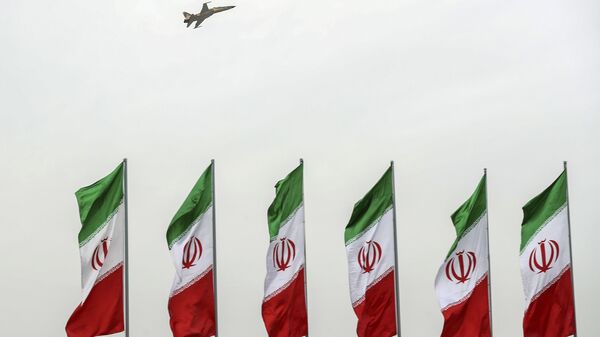The son of King Salman took to Twitter, saying that "the attack by the Iranian-backed Houthi militias… proves that these militias are merely a tool that Iran's regime uses to implement its expansionist agenda in the region…"
This comes as 'Arab News, a Saudi newspaper,' called for targeted US military strikes against Tehran.
The threat of a possible military confrontation between the US and Iran is growing. Last week, President Trump approved the deployment of warships and warplanes in the Persian Gulf region.
Sputnik discussed the possibility of a war between the US and Iran amid rising tensions with Dr. Foad Izadi of the Faculty of World Studies at the University of Tehran.
Sputnik: So let's start with the Fujairah incident, what do you think was behind that incident, and you think it was a pretext for a possible real confrontation between Iran and the United States?
Foad Izadi: We don't know who was behind the incident. The Iranian government has condemned the incident, and we hope that it is not an excuse to start a military confrontation with Iran. Iran is not interested in a military confrontation with the United States. We have witnessed in the past, what they call false-flag operations, operations that are designed to start a war by claiming that someone has attacked them, this is how the Gulf of Tonkin incident was orchestrated and that resulted in the Vietnam War. So we hope that US policy makers are intelligent enough to realize that having a military confrontation with Iran is not in the interest of anyone and they will refrain from such engagements.
Sputnik: There was a lot of talk about Donald Trump's foreign team, John Bolton and Mike Pompeo, do you think they are the main actors in this possible confrontation between Iran and the United States? Do you think they are pursuing their own interests and Donald Trump is just listening to them?
Foad Izadi: Both John Bolton and Mike Pompeo have called for a military strike against Iran in the past. John Bolton wrote an article for the New York Times in March 2015 asking for a military strike on Iran. Pompeo did the same thing when he was a congressman, and now they are occupying important positions in the US government and we have the fear that they may implement what they'd called for. Trump campaigned for presidency in 2016 criticizing the Iraq war and criticizing the endless wars that the US engages in in the Middle East, so he should not be starting a new confrontation with Iran, that's what logic dictates, but we have seen in the past that he's influenced by people who are around him. For example, he wanted to get the US troops out of Syria but then people around him, Bolton and Pompeo, made him say basically that they're not getting out. He wanted to improve relations with Russia and that's not happening for the same reason. He wanted to have an agreement with North Korea but that's also not really working out, so there's a fear that people that surround Trump may actually lead him into a war that he really doesn't want.
Sputnik: Recently in the New York Times there was an article which claimed that Donald Trump didn't really like Bolton's attempt to drive him into a conflict with Iran, do you think that Bolton and Pompeo as well overplay themselves with all this Iran confrontation rhetoric and their actions to start a war?
Foad Izadi: They said they're interested and they used to be interested in military confrontation and they may actually want to implement that policy. The only problem they have is that Iran is not interested in a military confrontation, so Iran will refrain from activities that will give them some excuse to attack Iran. And hopefully Trump will realise what these guys are doing, Bolton and Pompeo. He changes people around him quite often, Bolton is the third National Security Advisor and Trump has been President for less than two years, so there is hope that he actually realizes that they're pushing him towards a military confrontation and he would correct the mistakes that he's made by appointing these people.
READ MORE: Trump Tells Aides He Does Not Want War with Iran — Reports
Sputnik: Speaking about other countries' positions regarding this issue, I think basically this week there was a summit between the United States and European partners and despite US pressure, European leaders didn't say anything particular about the Iranian crisis. Do you think there's a real gap in the relationship between EU leaders and the United States regarding Iran?
Foad Izadi: You know there is a gap; Europeans wanted to stay in the Nuclear agreement, they opposed the US getting out of the agreement without any justification and they don't want to see a military confrontation between Iran and the Unites States; they are worried about the foreign policy that Trump and people around him are engaging in. The only problem with Europe is they're not able to or not willing to stand up to Trump, they have their own issues with the United States, they're competing with each other in the European Union to have better economic packages with the United States, so they have lots of things to worry about, and it seems they're not able to do an independent foreign policy. They in practice are following Trump in his disastrous policy that he has engaged in.
Sputnik: Do you see any future for the Iran nuclear deal? The The United States pulled out a year ago, but the European Union, Russia and China are still trying to preserve this agreement, do you think Iran is willing to continue their agreement with these countries?
Foad Izadi: You know Iran is not benefiting from the agreement. The idea behind the agreement was that Iran would limit its nuclear programme and then the sanctions are lifted. Iran limited its programme, gave a lot of concessions; even Iran waited for one whole year after the US got out, but Iran is not getting anything out of the agreement and it's not logical for Iran to stay in the agreement. It's a multilateral agreement; it's not possible to unilaterally follow a multilateral agreement, so Iran will get out of the agreement sooner or later. Iran has given the Europeans 60 days to fix the problems that they have and actually follow the agreement. The US got out of the agreement officially, Europeans are also out of the agreement unofficially, because they are not doing anything they are supposed to do. Iran gave them 60 days and I think that at the end of 60 days Iran will gradually get out, and I think overall the nuclear agreement is dead.
*Views and opinions expressed in this article are those of Dr. Foad Izadi and do not necessarily reflect those of Sputnik.




